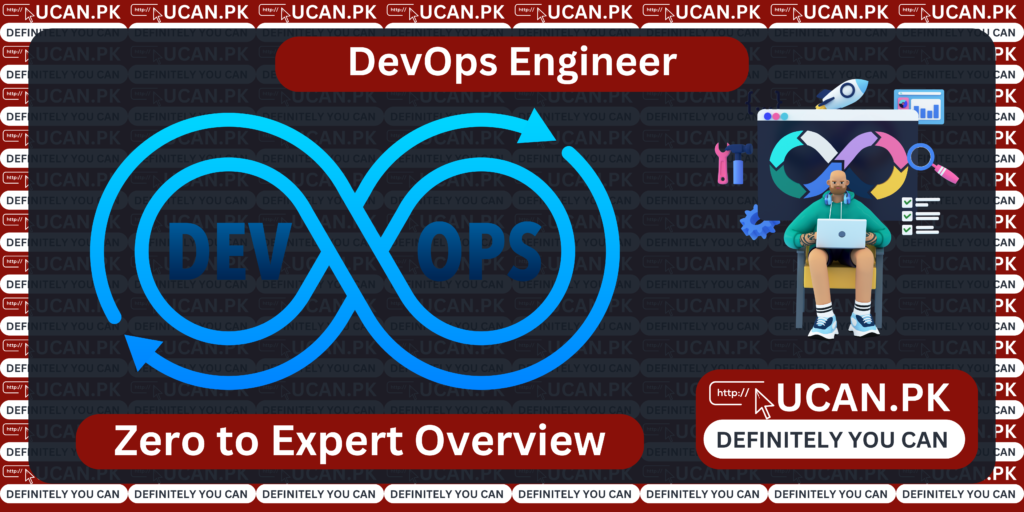DevOps Engineer Overview
A DevOps Engineer is a specialized IT professional who bridges the gap between software development and IT operations. They focus on automating and streamlining the software development and deployment processes to ensure rapid and reliable delivery of software products. The role encompasses a wide range of responsibilities, including infrastructure management, continuous integration and deployment (CI/CD), monitoring and logging, and ensuring security and compliance.

Brief History
The term “DevOps” was coined in the late 2000s by Patrick Debois and others who recognized the inefficiencies and disconnects between development (Dev) and operations (Ops) teams. Traditional software development methods often led to conflicts between these teams, resulting in slow deployments, increased errors, and higher costs. The DevOps movement sought to address these issues by promoting collaboration, automation, and integration of development and operations. Over the years, DevOps has evolved from a niche practice to a mainstream approach adopted by organizations of all sizes across various industries.
Future of DevOps Engineer
The future of DevOps is bright, driven by advancements in technology and the increasing adoption of digital transformation strategies by organizations. Key trends shaping the future of DevOps include:
- AI and Machine Learning: AI and ML are being integrated into DevOps processes to enhance automation, predict issues, and optimize resource utilization.
- Serverless Computing: Serverless architectures reduce the need for managing infrastructure, allowing DevOps engineers to focus more on code and less on servers.
- Edge Computing: As edge computing becomes more prevalent, DevOps practices will need to adapt to manage and deploy applications across distributed environments.
- Security Integration (DevSecOps): Incorporating security practices into the DevOps pipeline is becoming increasingly important, leading to the rise of DevSecOps.
- Microservices and Containers: The adoption of microservices architecture and containerization (e.g., Docker, Kubernetes) will continue to grow, requiring specialized DevOps skills.
Educational Requirements for DevOps Engineer
To become a DevOps Engineer, one needs a strong educational foundation in computer science and related fields. Here are the detailed educational requirements:
- Bachelor’s Degree:
- Field of Study: Computer Science, Information Technology, Software Engineering, or a related discipline.
- Core Courses: Programming, data structures, algorithms, operating systems, networking, database management, and software engineering.
- Master’s Degree (optional):
- Specializations: Cloud Computing, Cybersecurity, Software Development, or DevOps.
- Benefits: Advanced degrees can provide deeper knowledge and open up higher-level career opportunities.
- Certifications:
- AWS Certified DevOps Engineer: Focuses on managing and operating AWS environments.
- Google Professional DevOps Engineer: Validates skills in managing GCP-based DevOps processes.
- Certified Kubernetes Administrator (CKA): Demonstrates proficiency in managing Kubernetes clusters.
- Microsoft Certified: DevOps Engineer Expert: Covers Azure DevOps practices.
- Online Courses and Bootcamps:
- Platforms like Coursera, Udemy, edX, and LinkedIn Learning offer courses on DevOps tools and practices.
- Bootcamps provide intensive, hands-on training on DevOps technologies and methodologies.
Educational Strategy for a Younger Person (Student)
- High School Preparation:
- Subjects: Focus on STEM (Science, Technology, Engineering, Mathematics) subjects, particularly computer science and mathematics.
- Extracurricular Activities: Participate in coding clubs, hackathons, and IT workshops to gain practical experience.
- Bachelor’s Degree:
- Major Selection: Choose a relevant major such as Computer Science, Information Technology, or Software Engineering.
- Projects and Internships: Engage in internships or part-time jobs to gain hands-on experience and practical skills.
- Skill Development:
- Programming Languages: Learn Python, Java, Bash, and PowerShell.
- CI/CD Tools: Gain proficiency in Jenkins, GitLab CI, CircleCI, or similar tools.
- Cloud Platforms: Get hands-on experience with AWS, Azure, and Google Cloud.
- Containerization: Learn Docker and Kubernetes for container management and orchestration.
- Certifications: Start with foundational certifications like AWS Certified Developer Associate or Microsoft Azure Fundamentals.
- Projects and Internships: Work on real-world projects and secure internships to apply theoretical knowledge in practical settings.
Experience and Skills for DevOps Engineer
- Technical Skills:
- Programming and Scripting: Proficiency in languages like Python, Java, Bash, and PowerShell.
- Automation Tools: Experience with Jenkins, GitLab CI, CircleCI.
- Cloud Platforms: Knowledge of AWS, Azure, Google Cloud.
- Containerization and Orchestration: Experience with Docker and Kubernetes.
- Monitoring and Logging: Familiarity with Prometheus, Grafana, ELK stack, Splunk.
- Soft Skills:
- Collaboration and Communication: Ability to work effectively with cross-functional teams.
- Problem-Solving: Strong analytical and troubleshooting skills.
- Adaptability: Willingness to learn new technologies and adapt to changing environments.
Expanding Scope and Establishment of Self Business
DevOps Engineers can expand their scope and establish self-business opportunities in several ways:
- Specialization:
- Cloud Architecture: Become a cloud architect specializing in designing scalable and resilient cloud infrastructures.
- Cybersecurity: Focus on integrating security practices into the DevOps pipeline (DevSecOps).
- AI/ML Operations: Specialize in deploying and managing AI/ML models and infrastructure.
- Consulting Services:
- Training and Certification:
- Online Courses: Develop and sell online courses or provide training on DevOps tools and methodologies.
- Workshops and Bootcamps: Organize workshops and bootcamps to train aspiring DevOps professionals.
Jobs and Earning Capacity for DevOps Engineer
- Entry-Level: Junior DevOps Engineer, DevOps Associate
- Experience: 0-2 years
- Responsibilities: Assisting in CI/CD pipeline management, basic scripting, monitoring support.
- Average Salary:
- USA: $70,000 – $90,000
- Pakistan: PKR 600,000 – PKR 1,200,000
- India: INR 500,000 – INR 900,000
- Mid-Level: DevOps Engineer, Cloud DevOps Engineer
- Experience: 3-5 years
- Responsibilities: Managing CI/CD pipelines, automating infrastructure, deploying applications.
- Average Salary:
- USA: $90,000 – $120,000
- Pakistan: PKR 1,200,000 – PKR 2,400,000
- India: INR 900,000 – INR 1,500,000
- Senior-Level: Senior DevOps Engineer, DevOps Architect
- Experience: 5+ years
- Responsibilities: Designing CI/CD architectures, leading DevOps teams, strategic planning.
- Average Salary:
- USA: $120,000 – $160,000
- Pakistan: PKR 2,400,000 – PKR 4,000,000
- India: INR 1,500,000 – INR 2,500,000
Geographic Variations in Salary
- North America: Highest salaries due to the strong demand for tech talent and cost of living.
- Europe: Competitive salaries, with higher wages in countries like Germany, UK, and the Netherlands.
- Asia: Salaries vary widely, with significant differences between countries like Japan, China, India, and Pakistan.
- Middle East: Competitive salaries in tech hubs like UAE and Saudi Arabia.
- Australia: High demand for DevOps skills leading to attractive salaries.
Conclusion
The role of a DevOps Engineer is critical in modern IT ecosystems, ensuring seamless integration and deployment of software. With the right educational background, skills, and experience, a career in DevOps offers excellent growth prospects, diverse opportunities, and competitive salaries worldwide. As technology continues to evolve, the demand for skilled DevOps Engineers will only increase, making it a highly attractive career path
FAQs about DevOps
Is DevOps a coding job?
DevOps is not solely a coding job, but it does involve a significant amount of coding. DevOps engineers often write scripts to automate tasks, develop CI/CD pipelines, and work with code repositories. However, the role also requires a strong understanding of system administration, networking, and infrastructure management.
What are the skills required for a DevOps engineer?
A DevOps engineer needs a diverse skill set, including:
- Proficiency in scripting languages (e.g., Python, Bash, Ruby)
- Understanding of version control systems (e.g., Git)
- Experience with CI/CD tools (e.g., Jenkins, Travis CI)
- Knowledge of configuration management tools (e.g., Ansible, Puppet, Chef)
- Familiarity with containerization (e.g., Docker) and orchestration (e.g., Kubernetes)
- Understanding of cloud platforms (e.g., AWS, Azure, GCP)
- Strong problem-solving and collaboration skills
What is a DevOps engineer’s salary?
The salary of a DevOps engineer varies depending on location, experience, and company. In the United States, the average salary for a DevOps engineer ranges from $95,000 to $140,000 per year. Senior DevOps engineers can earn significantly more, often exceeding $150,000 annually.
Is DevOps an IT job?
Yes, DevOps is an IT job. It involves managing and automating the processes of software development, deployment, and infrastructure management to ensure efficient and reliable IT operations.
Is DevOps easy to learn?
Learning DevOps can be challenging due to the broad range of skills and knowledge required. It involves mastering various tools, technologies, and best practices related to software development, system administration, and IT operations. However, with dedication and the right resources, it is achievable.
Which language is used in DevOps?
Several languages are commonly used in DevOps, including:
- Python
- Bash/Shell scripting
- Ruby
- Go
- JavaScript (for some automation tasks)
The choice of language often depends on the specific tools and environments being used.
Who is eligible to become a DevOps engineer?
Anyone with a background in software development, system administration, or IT operations can pursue a career in DevOps. Relevant experience and skills in scripting, automation, and cloud computing are highly beneficial.
Can I get a DevOps job with no experience?
Getting a DevOps job with no prior experience can be challenging. However, starting in a related IT role, gaining relevant certifications, and building a solid foundation in the necessary skills can improve your chances. Internships and entry-level positions can also provide valuable experience.
Can I learn DevOps without coding?
While coding is a significant aspect of DevOps, it is possible to start learning DevOps concepts without extensive coding knowledge. Understanding the basics of scripting and automation is essential, and over time, developing coding skills will enhance your effectiveness as a DevOps engineer.
Which IT job is the highest paid?
Several IT jobs are known for high salaries, including:
- Solutions Architect
- Cloud Engineer
- Data Scientist
- Machine Learning Engineer
- DevOps Engineer
- Security Engineer
Among these, roles in cloud computing, machine learning, and security often command the highest salaries.
Can a fresher become a DevOps engineer?
While it is uncommon, a fresher can become a DevOps engineer by gaining relevant knowledge and skills through education, certifications, internships, and hands-on projects. Building a strong foundation in IT fundamentals and showcasing your abilities through personal projects or contributions to open-source communities can help.
Is a DevOps job stressful?
DevOps roles can be stressful due to the need for constant monitoring, quick problem-solving, and ensuring the smooth functioning of critical systems. However, good time management, effective communication, and a collaborative work environment can help mitigate stress.
Can I learn DevOps in 1 month?
Learning the basics of DevOps in 1 month is possible, but mastering the field typically takes longer. Within a month, you can gain a foundational understanding of key concepts and tools, but practical experience and in-depth knowledge will require more time and practice.
Can a non-IT person learn DevOps?
A non-IT person can learn DevOps, but it may require a steeper learning curve. Starting with basic IT concepts, programming, and system administration skills will be essential. With dedication and the right resources, transitioning to a DevOps role is achievable.
Is DevOps difficult?
DevOps can be challenging due to its broad scope and the need for a diverse skill set. It requires continuous learning and adaptation to new tools and technologies. However, with a solid understanding of IT fundamentals and a willingness to learn, it can be a rewarding and fulfilling career.
Feel free to ask if you have any more questions or need further information!
